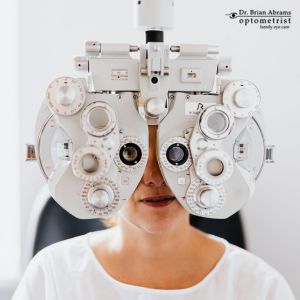Diabetes can have a significant impact on your vision and overall eye health. High blood sugar levels over time can damage the small blood vessels in your retina, which over time leads to a condition called diabetic retinopathy. Untreated, diabetic retinopathy can eventually result in severe vision loss. To protect your vision and eye health, diabetic eye exams are a vital part of ongoing diabetes management. To preserve your vision, detect eye problems early, and maintain eye care, visit Dr. Brian Abrams, a qualified and trusted optometrist in Vaughan for your eye exam.
What is a Diabetic Eye Exam?

A diabetic eye exam is more thorough than a standard eye test, as it focuses specifically on identifying changes in the eye that are associated with diabetes. At your appointment with an optometrist in Vaughan, you can expect a comprehensive evaluation tailored to your unique health needs.
Medical History and Vision Changes
Your eye doctor will review your medical history and potentially ask questions about how long you’ve had diabetes, your blood sugar control, any vision changes you’ve noticed, as well as other existing health conditions. Sharing accurate and up-to-date information helps our team assess your risk level and tailor the exam accordingly.
Visual Acuity Test
Visual acuity tests are a standard step in virtually all eye exams. It measures how clearly you can see at different distances and helps your doctor understand if your vision has changed since your last exam. Blurry vision can be one of the early signs of diabetic complications.
Dilated Eye Exam
One of the key components of a diabetic eye exam is pupil dilation. Your optometrist will apply special eye drops to widen your pupils, allowing a clear view of the retina and optic nerve at the back of your eye. This step is essential for detecting early signs of diabetic retinopathy, swelling, leaking blood vessels, or new abnormal vessel growth.
Retinal Imaging
Advanced technology like digital retinal imaging or OCT scans may be used to capture detailed images of the retina. Conducting these tests during a diabetic eye exam allows your doctor to monitor changes to your anatomy over time and document the extent of any damage. If you’re showing early signs of diabetic retinopathy or macular edema, imaging can guide your treatment plan. For more insight on how to protect your eyes and get tailored treatments, book an exam with Dr. Brian Abrams.
Intraocular Pressure and Other Tests
Our experienced optometrist in Vaughan may also check the pressure inside your eyes to rule out glaucoma, which is another condition that people with diabetes are at increased risk for. A full exam may include additional testing depending on your symptoms and risk factors.
After Your Exam
Following your diabetic eye exam, Dr. Brian Abrams and our team will explain the results and any next steps. If eye diseases related to diabetes are detected, you may be referred to a retinal specialist or given a treatment plan that may include closer monitoring, changes to your diabetes management, or other interventions.
Prioritize Your Eye Health with Your Trusted Optometrist in Vaughan
Routine diabetic eye exams can help you maintain clear vision and prevent serious complications. Early detection and treatment are the most effective ways to preserve your sight. If you’re managing diabetes, book your next diabetic eye exam with our experienced optometrist in Vaughan, Dr. Brian Abrams, to stay proactive about your eye health.


